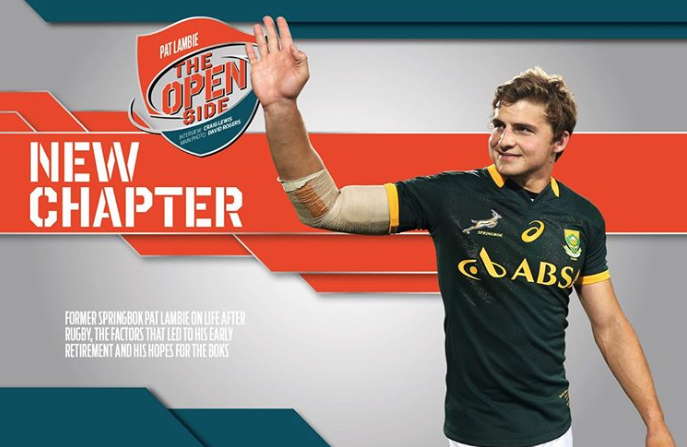Former Springbok Pat Lambie on life after rugby, the factors that led to his early retirement and his favourite memories from his career.
You’ve been retired for more than nine months. What was the most difficult part about making that decision and what has it been like since you made the announcement?
The most difficult part is knowing that I will never again be able to play a sport I love so much and I had to give up on some of my dreams and ambitions. It has been a tough time. Everything changed quite suddenly and not knowing what the future holds is daunting. But I think we are through the worst now and there is some direction. New baby, new home, new career, new chapter.
After the collision with Ireland’s CJ Stander at Newlands in 2016 and the struggle with head-knock symptoms that followed, you went to play abroad. Do you think that taking a sabbatical or moving to Japan’s Top League instead of the more physical Top 14 might have been more beneficial?
It’s difficult to say. A long sabbatical may have prolonged my career, but one of the reasons I had to stop playing is that no specialist could tell me what the consequences of another head knock would be, or if I would ever be able to take another big collision without experiencing symptoms. Since 2016, I haven’t been able to shake off any bangs to the head. A year or two off might not have changed that. I loved playing for Racing 92 in the Top 14 and European Champions Cup, I don’t regret that experience at all.
Having said that, do you think it might have been a good move to go overseas earlier than you did?
It was very refreshing to be in a different environment and out of my comfort zone. It was also refreshing to move away from some of the pressures and expectations in SA, and get back to playing with some freedom and enjoyment again. As I said, it was a special time in Paris but we were not ready to go any sooner than when we did.
It seems there is a spotlight on the subject of concussion. Do you think World Rugby needs to make a more concerted effort regarding concussion protocols and player welfare?
I think we are on the right track. There are programmes in place to improve player welfare and concussion management. One of the biggest issues is that the mindset of players needs to change. Concussion is still not taken seriously enough by players, who like to brush it off and get back on the horse.
Most professional rugby players have the mentality of playing through the pain. How do we get to a point where players and coaches have a change in this mindset?
I don’t have the answers. I can say that the more input there is from someone in a neutral position, an outsider, or someone who is able to see the bigger picture when it comes to making the right call, the better. Coaches and players get caught up in combat mode, where the next game is the most important, and the pressures of results and not missing out sometimes outweigh health considerations. Having someone external to give perspective or even make return-to-play decisions can help make things easier for coaches and players.
There is perhaps a perception that head injuries aren’t as serious as other injuries. What was your experience of this?
It is a perception that really needs to change. But you can sort of understand why … break a bone and there is surgery to repair it and a brace of some sort to wear afterwards, with an accepted time frame to get back on to the field. Tear a ligament or a muscle, scans will show the damage and your rehab journey begins. Some bruising is visible, maybe a scar, and the discomfort of the injury can be seen through a limp or hobble or lack of physical ability of some sorts. With your head, it is often only the symptoms side of the equation that are the problem. Scans come back clear, no operation is required and there is no brace to wear for anyone to see that something is wrong. But something is wrong. Maybe this is one of the reasons people don’t treat head injuries as seriously as others?
What do you miss the most about the game?
I miss a lot of things – building friendships on and off the field, how the challenge changes from week to week with each opponent, the rush of running on to the field in front of a full stadium, the adrenaline, especially in the big moments. I probably miss the change-room environment after a successful game the most.
What were your favourite moments in a Springbok and Sharks jersey?
The winning penalty kick for the Springboks at Ellis Park against the All Blacks in 2014, and the try in the first half of the 2010 Currie Cup final against Western Province.
How did you always manage to appear so calm under intense pressure during big matches?
Looks can be deceiving. I always had lots of butterflies before games and big moments. Maybe I was lucky to thrive off the adrenaline and excitement of these times.
You’ve played at fullback but your preferred position was flyhalf. Who is the best scrumhalf you played alongside?
I was lucky to play with some of the best for the Springboks: Fourie du Preez and Ruan Pienaar. I also really enjoyed my connection with Charl McLeod and Cobus Reinach at the Sharks too.
After hearing Robbie Wessels’ dedication song, your family was in tears. What was your immediate reaction?
I had to quickly brush up on my Afrikaans! It took a few takes for me to fully understand it. I couldn’t believe how complimentary and kind he was with his words – and for even writing the song in the first place.
You recently became a father. How has the transition into fatherhood been?
It is the most incredible feeling to be a parent. The timing of Jackson’s birth has been amazing too. So much excitement and so much to look forward to as a family.
What does the future hold for you and your family?
We were lucky to have been able to take a few months to transition back to life in South Africa from France. Since returning, I’ve had an opportunity to join the Collins Group, a company where I spent some time doing work experience during my playing days. They are involved in a few things, including property development, tourism, private equity and farming. I’m trying to learn as much as I can while applying some of the things I learned in the professional sporting world and through my degree. My involvement has mostly been on the property development side. It is really impressive to see a company that is pouring so much investment back into South Africa and trying to create positive sentiment. I am excited and grateful that there is direction into the future and that this next chapter is now under way.
– This article first appeared in the November issue of SA Rugby Magazine, now on sale





